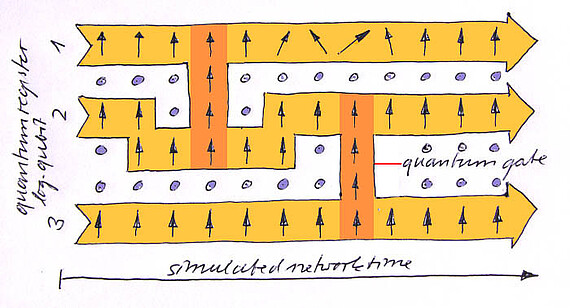Zeige Ergebnisse 81 -
89
von 89
2003
Raussendorf R, Browne DE, Briegel HJ. Measurement-based quantum computation on cluster states. Physical Review A - Atomic, Molecular, and Optical Physics. 2003 Aug 25;68(2):32. doi: 10.48550/arXiv.quant-ph/0301052, 10.1103/PhysRevA.68.022312
Raußendorf R. Measurement-based quantum computation with cluster states. München: Ludwig–Maximilians–Universität München, 2003.
Raußendorf R, Briegel HJ. Method for Quantum Computing. WO0227653A3. 2003 Nov 20.
2002
Briegel HJ, Raußendorf R, Schenzle A. Optical Lattices as a Playground for Studying Multiparticle Entanglement. in Figger H, Zimmermann C, Meschede D, Hrsg., Laser Physics at the Limits. Berlin: Springer Verlag. 2002. S. 433–447 doi: 10.1007/978-3-662-04897-9_40
Dür W, Raussendorf R, Kendon VM, Briegel HJ. Quantum walks in optical lattices. Physical Review A - Atomic, Molecular, and Optical Physics. 2002 Nov 22;66(5):8. doi: 10.48550/arXiv.quant-ph/0207137, 10.1103/PhysRevA.66.052319
Raussendorf R, Browne DE, Briegel HJ. The one-way quantum computer: A non-network model of quantum computation. Journal of Modern Optics. 2002 Jul 10;49(8):1299-1306. doi: 10.48550/arXiv.quant-ph/0108118, 10.1080/09500340110107487
Raußendorf R, Briegel HJ. Computational model underlying the one-way quantum computer. Quantum Information and Computation. 2002;2(6):443-486. doi: 10.26421/qic2.6-3
2001
Briegel HJ, Raussendorf R. Persistent Entanglement in Arrays of Interacting Particles. Physical Review Letters. 2001 Jan 29;86(5):910-913. doi: 10.48550/arXiv.quant-ph/0004051, 10.1103/PhysRevLett.86.910
Raussendorf R, Briegel HJ. A One-Way Quantum Computer. Physical Review Letters. 2001 Mai 28;86(22):5188-5191. doi: 10.1103/PhysRevLett.86.5188


